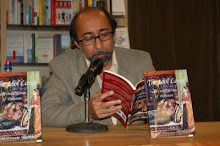"What to Aiken’s mind has always been a matter of betrayal from Kelly when she left town and eventually married after Aiken joined the army, Kelly’s perspective shatters his sense of self. Their last love-making moment, she considers rape."
Sunday, August 16, 2020
Moazzam Reviews Clifford Garstang's The Shaman of Turtle Valley for Heavy Feather Review
According to one view, America keeps a certain part of its population illiterate and poor, Whites and non-Whites, on purpose to be used as cannon fodder for its imperial wars around the globe. Without any regard for their well-being afterwards if they’re lucky enough to return in one piece. It is not rocket science to see the connection between the Korean War and onward to a rising number of veterans ending up homeless on American streets, begging or going insane. So it is only natural that Aiken, the younger son of Henry and Ruth, joins the army to be deployed to Kuwait and Iraq around Desert Storm. Luckily his deployment is short, though he has his share of war trauma but it has spared him more or less. Before he can quit the army, however, his second deployment takes him to South Korea, where he befriends an underage young woman interested in practicing her English with American soldiers and gets her pregnant towards the end of his tenure.
Saturday, August 8, 2020
My Re-evaluation of noted writer Altaf Fatima's Urdu Novel Chalta Mussafir
A historian’s focus is on facts extracted from primary or secondary sources offering a counter-narrative. For example, in the US ‘the no taxation without representation’ narrative persists. Some historians have however argued that the fear of losing slaves caused the revolution. There were slave rebellions. Then King George III issued the Royal Proclamation of 1763, forbidding white settlers from usurping more land from the natives.
Historian Gerald Horne argues that the revolution was, in fact, a counter-revolution spelling disaster for African Americans and Native Americans. When novelists enter the fray, they draw a narrative arc with ordinary humans at the centre. Altaf Fatima’s novel Chalta Mussafir was written about a decade after Pakistan army’s unconditional surrender in Dhaka.
Except for the weak ending, I loved her book Daskat Na Do (The One Who Did Not Knock, translated finely by Rukhsana Ahmed) for its diction and for situating two outsiders at the heart of the story. One would think that a decade was a long enough time to gain perspective about an emotionally charged moment in history, and weigh official and unofficial narrative and counter-narratives to offer an undidactic lens. An equal number of Hindus and Muslims don't have to die and en equal number of perpetrators of violence should not should not also be lined up. Since no one has a complete grip on the truth, the author must look far and wide.
Read the rest Here


